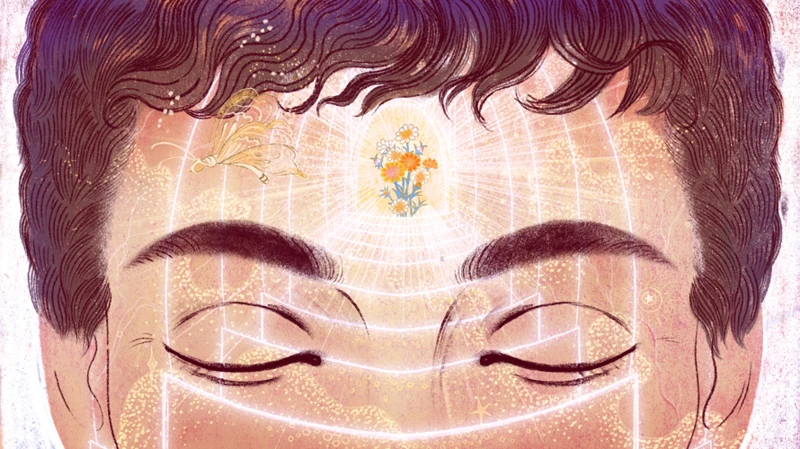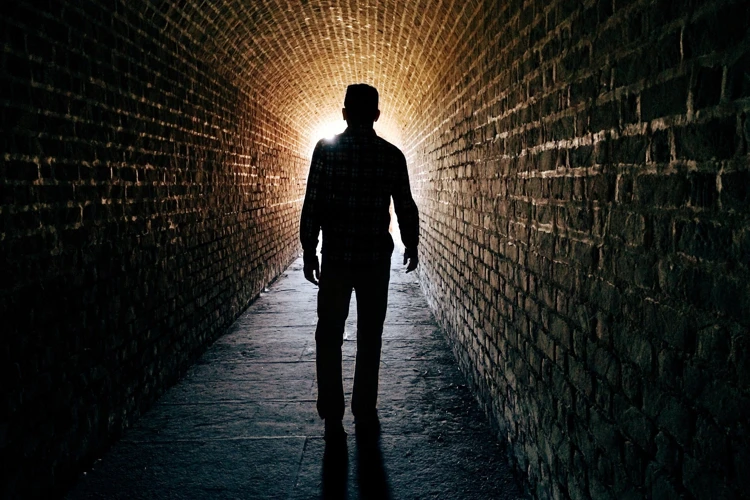The concept of death has always been a mystery to humans, and the fear of the unknown towards it has been embedded deep in our psyche. Interestingly, near-death experiences (NDEs) have provided us with an opportunity to examine and understand this fear more closely. NDEs are fascinating phenomena that have been reported by people who have undergone a close brush with death, such as during an accident or a medical emergency. These experiences are rich in mystifying details of encounters with deceased loved ones and spiritual beings, as well as a host of other unexplainable occurrences. However, what is most intriguing about NDEs is the common thread of fear that runs through most of them. This article will delve into the fear of death in NDEs and explore its causes, relationship with spirituality, methods of coping, and the wider implications of NDEs on our understanding of consciousness and the afterlife.
What Are Near-Death Experiences?

Have you ever heard of individuals who claim to have had an otherworldly experience when they were close to death? These encounters are called near-death experiences or NDEs. It involves a broad range of inexplicable and sometimes thrilling sensations that individuals feel when they are on the brink of death. For many years, individuals who reported having NDEs were viewed with skepticism by the scientific community. However, continued research has provided substantial evidence that these experiences are legitimate and warrant further exploration. In this section, we will take a closer look at the characteristics and common experiences of NDEs.
The Characteristics of NDEs
As per the research conducted on Near-Death Experiences (NDEs), there are some common characteristics observed which are described below:
- Out-of-body experience: The person feels like they are outside their body, watching their own physical body from a distance.
- Heightened senses: Individuals report experiencing more vivid and intense senses, such as hearing, touch, sight, and smell. These experiences often go beyond what is considered normal human perception.
- Lifelike hallucinations: NDEs often involve encounters with people, beings, or entities that are not present in reality. Nevertheless, these experiences feel very real, as though they are occurring in real life.
- Timelessness: NDEs are often described as time-distorting experiences where individuals lose their sense of time and space. They may report feeling like they have been in the experience for an extended period, even if it only lasted a few seconds or minutes.
- Emotional intensity: Many individuals have reported feeling emotions much more strongly than in their day-to-day lives during NDEs. These emotions can include intense joy or euphoria, as well as panic, anxiety, and fear.
These characteristics have been observed across various cultural, linguistic, and religious backgrounds, indicating that they are universal experiences. Despite this, there is still much debate and research ongoing on the subject of NDEs, particularly regarding their origins and their implications for the nature of consciousness and the afterlife.
Common Experiences During NDEs
During near-death experiences (NDEs), individuals may report a variety of common experiences. These include:
- Out-of-body experiences: Many people report feeling as though they are floating above their body and observing their surroundings from a different perspective.
- Meeting deceased loved ones: Some individuals report encountering deceased loved ones during their NDE, who offer comfort and support.
- Encountering a bright light: Many people report seeing a bright, glowing light that is associated with feelings of warmth, love, and peace.
- Feeling a sense of detachment: Some people report feeling a sense of detachment or separation from their physical body and earthly concerns.
- Experiencing a life review: During an NDE, some individuals report seeing a panoramic review of their life, including both positive and negative experiences.
- Experiencing a sense of peace: Many people report feeling a profound sense of peace and tranquility during their NDE, regardless of any fear or pain that they may have experienced prior.
- Encountering spiritual beings: Some people report encountering spiritual beings, such as angels or guides, during their NDE.
These experiences can vary in intensity and frequency from person to person, but they are often reported as being intensely vivid and deeply meaningful. While skeptics may dismiss NDEs as hallucinations or wishful thinking, many people who have experienced them find them to be deeply transformative and affirming, providing a sense of perspective and purpose that can have a profound impact on their lives even after they return to consciousness.
The Fear of Death in NDEs

As we approach the topic of Near-Death Experiences (NDEs), one of the most intriguing aspects is the fear of death that often accompanies them. Although these experiences are often described as mystical, transformative, and peaceful, many who have undergone an NDE report feeling intense fear and anxiety during their encounter with death. Understanding the nature of this fear is essential in comprehending the full scope of NDEs and their implications on our spiritual beliefs and scientific understanding of the human brain. Let us delve deeper into the characteristics and causes of fear in NDEs.
The Presence and Causes of Fear
Fear is one of the most common experiences reported during near-death experiences (NDEs), and its presence can be both overwhelming and complex. There are various causes and triggers for this fear, which may include:
- Loss of control: during an NDE, individuals often feel out of control of their physical body and surroundings, leading to a sense of panic and fear.
- Unknown experiences: many people report encountering unfamiliar and bizarre sensations during their NDE, such as meeting deceased loved ones or experiencing a sense of being outside of their physical body. These unknown experiences can trigger fear and confusion.
- Negative entities: some individuals report encountering dark or negative entities during their NDE, which can be terrifying and trigger feelings of helplessness and intense fear.
- Threat of cessation: facing the possibility of death can be terrifying for many people, and the NDE only amplifies this fear, as individuals may feel that they are on the brink of ceasing to exist entirely.
The presence of fear during an NDE can vary greatly depending on the individual’s beliefs, cultural background, and personal experiences. What may be terrifying for one person may not be as impactful for another. It is important to note that while fear during an NDE is common, it is not inevitable and some individuals report experiencing a sense of peace and comfort during their experience.
The Relationship Between Fear and Spirituality
One of the most intriguing aspects of the fear experienced during near-death experiences (NDEs) is its connection to spirituality. The experience of a NDE can often be accompanied by a sense of otherworldly presence or connection to a higher power. This often results in a “transcendent” experience, where the individual feels as though they have gone beyond the boundaries of their physical self and entered into a spiritual realm.
Here are some possible explanations for the relationship between fear and spirituality during NDEs:
- Belief systems: Many individuals draw on their religious or spiritual beliefs to cope with the fear and uncertainty they experience during NDEs. This can involve calling upon a higher power for protection, or trusting that their fate is in the hands of a benevolent deity or force. Faith can provide a sense of comfort and reassurance, helping to alleviate the fear that accompanies the NDE.
- Expanded consciousness: It is possible that the fear experienced during NDEs is related to the expansion of consciousness that often accompanies them. Many individuals report feeling a sense of oneness with the universe, or an understanding of the interconnectedness of all things. This shift in perspective can be overwhelming, and may trigger fear or anxiety as the individual tries to integrate these new insights into their sense of self.
- Encounter with the divine: In some cases, the fear experienced during NDEs may stem from a direct encounter with a divine or celestial being. This encounter can be overwhelming, as it challenges the individual’s understanding of the nature of reality and their place within it. It may also involve a confrontation with the individual’s deepest fears and insecurities, as they are forced to confront the possibility of judgment and the consequences of their actions during their lifetime.
- Existential questions: Finally, it is possible that the fear experienced during NDEs is related to the existential questions that often arise during these experiences. Individuals may find themselves questioning the purpose and meaning of life, or struggling to come to terms with the inevitability of death. These questions can be unsettling, and may trigger a sense of fear or unease as the individual grapples with these larger issues.
Regardless of the cause, the presence of fear during NDEs highlights the powerful connection between spirituality and our understanding of death and dying. It reminds us that, even in the face of uncertainty and fear, there is the potential for profound spiritual transformation and growth.
The Role of Culture and Belief Systems in Fear
It is important to note that cultural and belief systems can significantly influence the way individuals experience and interpret fear during Near-Death Experiences (NDEs). For instance, in some cultures, death is seen as a transition to another existence or a higher plane of consciousness, which could potentially decrease the fear of death during a NDE. However, in other cultures, death is viewed as a finality or a punishment, resulting in heightened fear during a NDE.
Belief systems can also impact the interpretation of the experience. For those who have a strong religious or spiritual belief, a NDE might be interpreted as a spiritual awakening or an encounter with a divine entity, which could minimize the fear of death. In contrast, for individuals who do not hold such beliefs, the experience may be interpreted as a hallucination or a physiological response to trauma.
Furthermore, cultural and societal attitudes towards death and dying can significantly impact the expression of fear during NDEs. For example, in cultures where open displays of emotions are discouraged or considered inappropriate, individuals may be less likely to express or acknowledge their fear during the experience.
It is crucial to acknowledge the role of culture and belief systems in shaping the experience and interpretation of fear during NDEs. By understanding these cultural and individual differences, we can better support individuals before, during, and after their experiences, regardless of their cultural or spiritual background.
How to Process and Understand Fear in NDEs

Processing and understanding fear in near-death experiences can be a perplexing and challenging task. Fear is a common emotion experienced during NDEs, but it can be difficult to comprehend and integrate into one’s beliefs and worldview. It’s important to explore methods for coping with NDE-related fear and to understand the significance of ongoing fear after the experience. In this section, we will delve into the various approaches for processing and understanding fear in NDEs.
Methods for Coping with NDE-Related Fear
Coping with fear after a near-death experience (NDE) can be challenging, but there are various methods that can help individuals manage and overcome this fear.
1. Seeking Support: It is essential to seek emotional support from loved ones or a professional therapist who can offer guidance and coping strategies to deal with the fear of death.
2. Mindfulness and Meditation: Practising mindfulness and meditation can help individuals stay present and reduce anxiety by focusing on the present moment. These techniques can also improve emotional regulation, leading to an overall sense of calm and wellbeing.
3. Finding Meaning: Many NDErs find that their experience has given them a new sense of purpose and meaning in life. Focusing on this newfound perspective can help them find peace and alleviate fear.
4. Educating oneself: Learning about NDEs and their physical and psychological effects can help individuals better understand and cope with their experience. This can provide a sense of reassurance, an idea of what to expect, and the reassurance that you’re not alone in your experience.
5. Creativity and Art Therapy: Engaging in creative activities such as art therapy, music, or writing can be a helpful way to express emotions, gain insight, and reduce anxiety.
It’s important to remember that processing and coping with fear takes time and patience. Each individual’s experience is unique, and finding what works for them may require some exploration and experimentation. Nevertheless, with proper support, it is possible to manage and overcome the fear of death associated with NDEs.
Exploring the Significance of Ongoing Fear after NDEs
Exploring the Significance of Ongoing Fear after NDEs
While many individuals report positive transformations after having a near-death experience (NDE), there are also a subset of individuals who experience ongoing fear and anxiety after their NDE. This fear can manifest in various ways, such as a fear of death, a fear of losing control, or a fear of the unknown.
It is important to explore the root of this ongoing fear for individuals who experience it. Some possible explanations include struggles with integrating the NDE into their daily life, feeling isolated from others who cannot relate to their experience, or a lack of support from healthcare professionals.
It is also important to note that ongoing fear after an NDE does not negate the transformative aspects of the experience. The fear can be seen as an opportunity for growth and healing, as the individual learns to process and understand the complex emotions and experiences that come with an NDE.
Methods for Coping with NDE-Related Fear
For individuals experiencing ongoing fear after an NDE, there are various methods for coping and processing these emotions. These can include seeking therapy or support groups, practicing mindfulness and meditation techniques, engaging in physical activity, and journaling or creative expression. Finding ways to connect with a supportive community, whether through online forums or in-person groups, can also be helpful in navigating ongoing fear after an NDE.
Exploring the Spiritual and Scientific Implications
As we continue to explore the complex nature of NDEs and their effects on consciousness and the brain, it is important to also consider the spiritual implications of these experiences. For some, the fear that arises after an NDE can be seen as a reflection of their beliefs and understanding of the afterlife, while for others it may challenge their belief systems entirely.
From a scientific perspective, ongoing fear after an NDE may provide insights into the way that the brain and consciousness are interconnected, and how they are affected by profound experiences. Studying NDEs can also shed light on the relationship between the mind, body, and consciousness, and the way that these elements interact during transformative experiences.
Conclusion
While ongoing fear after a near-death experience can be difficult to navigate, it can also be an opportunity for growth and healing. By exploring the root of the fear, seeking support from a community, and engaging in coping mechanisms, individuals can learn to manage these complex emotions. Additionally, the study of NDEs can offer insights into the spiritual and scientific implications of these experiences, advancing our understanding of consciousness, the brain, and the afterlife.
Exploring the Spiritual and Scientific Implications
As we delve deeper into the phenomenon of near-death experiences (NDEs), we can’t help but confront the profound implications they hold for both spirituality and science. These extraordinary experiences challenge our historical notions of the afterlife and raise intriguing questions about the nature of consciousness and the brain’s role in shaping our perceptions. In this section, we’ll explore some of the spiritual and scientific implications of NDEs, highlighting the various avenues of research that have sprung forth from this intriguing subject matter.
The Afterlife and the Fear of Death
One of the central questions that arises from near-death experiences (NDEs) is whether they provide any evidence of an afterlife. While some argue that these experiences offer proof of an existence beyond death, others remain skeptical, questioning the validity and interpretation of such experiences. Nevertheless, it is clear that the fear of death plays a significant role in these experiences and how they are interpreted.
For those who have experienced NDEs, the prospect of an afterlife can be both comforting and overwhelming. The possibility of continuing consciousness beyond death raises profound theological, philosophical, and existential questions. Some individuals report encountering departed loved ones, spiritual entities, or deities, lending credence to the idea of an afterlife. However, others argue that such experiences are simply the result of changes in brain chemistry and have no bearing on the existence of any kind of afterlife.
Despite the ongoing debate surrounding the afterlife and NDEs, many individuals continue to report profound transformations after their experiences. For some, NDEs have led to a deeper sense of spirituality, purpose, and meaning in life. Others report a greater appreciation for the here and now, living more fully in the present moment. Ultimately, the question of the afterlife remains a deeply personal and subjective one, influenced by one’s cultural, religious, and philosophical perspectives.
The Role of NDEs in Advancing Our Understanding of Consciousness and the Brain
One of the most intriguing aspects of near-death experiences (NDEs) is their potential to deepen our understanding of consciousness and the brain. Despite decades of research, scientists are still struggling to fully comprehend the complex nature of consciousness and the mechanisms that generate it. However, NDEs offer unique insights into this phenomenon. Here are some ways in which NDEs could help advance our understanding of the brain and consciousness:
- Expansion of Consciousness: During NDEs, people frequently report a sense of expanded consciousness and heightened awareness. They describe being able to see and perceive things that are beyond the physical realm, such as colors and sounds that cannot be perceived with the physical senses. This suggests that consciousness may be more expansive than we currently believe it to be, and that it may be possible to access different states of consciousness under certain conditions.
- Non-local Consciousness: Similarly, NDEs challenge the notion that consciousness is confined to the brain and body. People who have had NDEs often describe a sense of being outside of their physical body, and of experiencing a non-local form of consciousness that is not bound by the physical limitations of the brain. This raises important questions about the relationship between consciousness and the brain, and challenges traditional conceptions of the mind-body problem.
- Neurophysiological Correlates: NDEs also provide clues about the neurophysiological correlates of consciousness. Studies of NDEs have shown that the brain undergoes significant changes during these experiences, including alterations in blood flow, oxygenation, and electrical activity. By identifying the specific brain regions and networks that are involved in generating NDEs, researchers may be able to gain a deeper understanding of the neural mechanisms that underlie consciousness.
- Integration of Science and Spirituality: Finally, NDEs offer a unique opportunity to bridge the gap between science and spirituality. While many aspects of NDEs are still shrouded in mystery, their profound and transformative nature has led some researchers to explore the spiritual and philosophical implications of these experiences. By integrating scientific and spiritual perspectives, NDEs have the potential to enrich our understanding of the nature of reality and our place within it.
Overall, NDEs represent a unique and fascinating phenomenon that has the potential to transform our understanding of consciousness and the brain. By continuing to study and analyze these experiences, we can gain important insights into the nature of reality and our place within it.
Conclusion
In conclusion, the fear of death is a complex and deeply ingrained experience that is commonly reported during near-death experiences (NDEs). While fear can be a natural response to the unfamiliar and potentially dangerous situations encountered during an NDE, it can also be rooted in cultural and personal beliefs about death and the afterlife.
Fortunately, there are a variety of coping mechanisms that can help individuals process their fear and move towards healing and understanding. These may include talking with loved ones, seeking support from a counselor or spiritual advisor, or simply sharing their story with others who have had similar experiences.
It is also important to note the potential spiritual and scientific implications of NDEs. They can offer insights into the nature of consciousness and the afterlife, as well as the workings of the brain during and after traumatic experiences. Further research and exploration in this area may lead to advancements in our understanding of death and its impact on the human psyche.
In all, while it may be unsettling to confront our own mortality, the fear and uncertainty experienced during NDEs can ultimately lead to profound personal growth and spiritual development. As we continue to learn more about these experiences and the complex emotions they elicit, we may gain a greater appreciation for the interconnectedness of life and the role that death plays in shaping our understanding of the world around us.
Frequently Asked Questions
How common are Near-Death Experiences?
About 5% of the global population has experienced an NDE at some point in their lives.
Do all people who experience NDEs feel afraid?
No, not all people who have NDEs report feeling fear. The experience varies from person to person.
Can NDEs be induced by outside factors?
There is no known way to intentionally induce an NDE. They typically occur spontaneously during life-threatening situations.
Can medications or drugs affect the experience of an NDE?
Some medications or drugs may affect the experience of an NDE, but research on the topic is still limited.
Are NDEs only reported in certain cultures or belief systems?
No, NDEs have been reported in various cultures and belief systems around the world, suggesting that they are a universal experience.
Can NDEs change a person’s religious or spiritual beliefs?
Yes, some people who experience an NDE report a greater sense of spirituality or a change in their religious beliefs. However, these changes are personal and not universal.
Can NDEs be harmful to a person’s mental health?
While some people may struggle with fear or anxiety related to their NDE, the experience is not typically harmful to a person’s mental health.
Are there any physical changes that occur during an NDE?
Research suggests that during an NDE, the brain undergoes significant changes in activity and blood flow, which may account for some physical sensations experienced during the NDE.
Can NDEs be studied scientifically?
Yes, scientists have been studying NDEs for decades, employing various methods such as brain imaging, psychological assessments, and interviews with NDE experiencers.
Is it possible to fully understand the experience of an NDE?
While research has shed some light on the topic, the experience of an NDE is complex and subjective, making it difficult to fully comprehend and explain.








